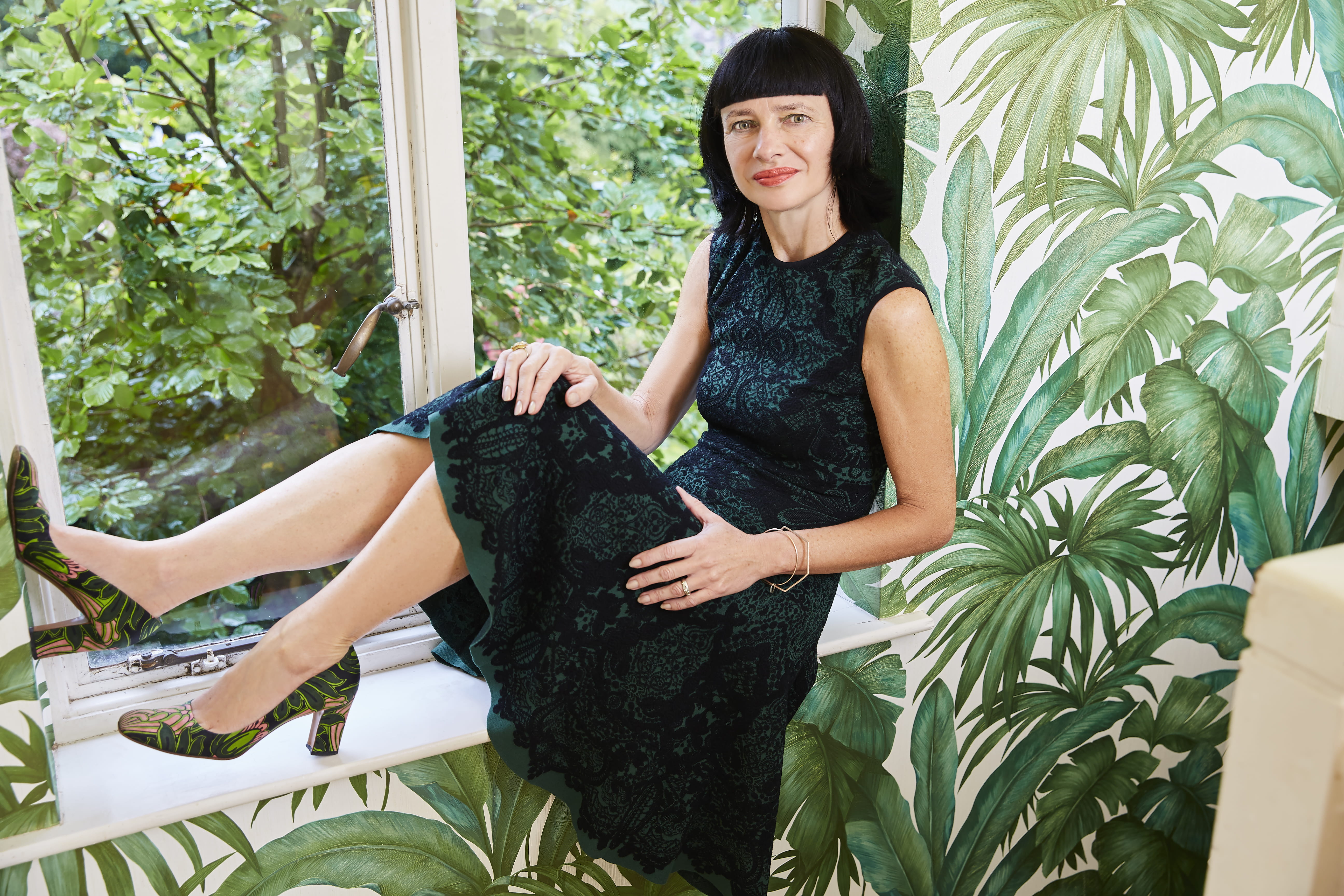The Time for Action Q&A: Carry Somers, Fashion Revolution

Carry Somers (MA Native American Studies, 1992) launched her multi-award-winning ethical fashion label, Pachacuti, in 1992. She founded Fashion Revolution, the world’s largest fashion activism campaign, in 2013.
Fashion Revolution, which now operates in 92 countries, campaigns to increase transparency in supply chains and raise public awareness regarding the systemic challenges facing the global fashion industry.
Carry says her time at Essex, including the research for her MA “very much informed where I am now. Activism has been a part of Essex since the beginning. It's important in the education and the curriculum, encouraging everyone to use their voice and use their power to bring about change, wherever they can.”

In the context of the climate and ecological emergency, what are the challenges facing the fashion industry?
“The global fashion industry relies on the exploitation of both natural resources and of the people working across its supply chains. It relies on producing more clothes than people need, and on manipulating people into over-consuming clothing at faster and faster rates.
“We know that some of the most severe and the most exploitative conditions tend to be where the raw materials are grown. That's also where most of the carbon impact is from garments and textiles.
“We've also got a huge problem with microplastics from synthetic fibres. 34.8% of the primary microplastics in the ocean are said to come from fashion and textiles and around 700,000 microfibres are lost from our clothes in every wash cycle.
“So people might think, ‘Oh, we need to move over to cotton’, but we know that cotton is hugely polluting. It also requires really significant water use and the fertilisers and pesticides are pretty much the highest of any crop.
“So there are really no easy answers.”
So what can we do?
“I remember at our first meeting, people were saying we should call it Fashion Evolution, we can't have a revolution, but I'm like, ‘No, we need radical change, we need to change our relationship with our clothing, we need a change in relationships within supply chains and we need human rights and the rights of nature as well.’
“We need to scale up our textile recycling and make sure that all textiles are collected and recycled properly.
“We also need to look to technology and innovation. I've been working with some people who are developing lab-grown cotton in Brazil. That's so exciting, because it's 10% of the water use of conventional cotton. It's that sort of innovation that we need, but we're not there yet.”
Is it possible to tackle the climate emergency without reducing consumption?
“I mean this is the big thorny issue, the elephant in the room. I was in an OECD webinar in February and they predicted that fashion consumption was due to increase by 81% by 2030. I mean, that is just so scary.
“In our Fashion Transparency Index, which ranks 250 of the world's biggest brands, only 9% of those brands are publishing any data about their production volume and the ones that do, the quantities are staggering, absolutely staggering.
“Only about a quarter are publishing information about the steps they're taking to reduce pre-consumer waste - so that's the off-cuts, the samples, the unsold stock. More and more retailers are starting to burn their unsold stock, either to preserve their brand reputation or because they don't know what to do with it. We really need to see legislation - like the new legislation in France - where brands can’t incinerate or send clothing and accessories to landfill.”
Fashion Revolution was launched in the wake of The Rana Plaza disaster, the fourth largest industrial disaster in history. 1,138 people died and many more were injured when an eight-storey building outside Dhaka, Bangladesh, collapsed. The five garment factories housed in Rana Plaza had been supplying a number of high-street names, including Benetton, Matalan and Primark.
The Rana Plaza disaster made headlines around the world, but other stories slip off the radar. How do we raise awareness?
“Whether it’s social media or the press, I think the media has a huge role to play. And I think it's also about taking people deep. We have a really good MOOC on Future Learn called Fashion’s Future: the Sustainable Development Goals and we've had over 30,000 learners on that course, which is amazing.
“That's what we need: something compelling and something which then leads people into taking action, because we've all seen the films and documentaries, but they sometimes leave you feeling powerless.
“We have a mantra at Fashion Revolution - be curious; find out; and do something about it - and you can do your own research.
“If you're buying a top from whichever brand, have a google. You know it's from Indonesia. Okay - are they using ancient and endangered woodlands in the viscose for your clothing? I've set that task to students in the past, and it has really taken them on a journey of discovery.”
What impact do you think the pandemic will have on our approach? There has been talk about resetting our values.
“Yeah, I'm very torn and I'm normally an optimist on this kind of thing.
“I don't think we can be complacent and think the pandemic is a turning point. We have to keep pushing brands and legislators to take action and keep taking action ourselves.
“I think a lot of people have learned to mend in the pandemic - I've done more darning than I've ever done! It's about realising the importance of these skills and buying clothes that are going to remain in our wardrobes for, you know, a decade, 20 years, 30 years to come.”
What, for you, are the five actions we can all take right now, to address the climate emergency?
“Firstly, ask the question #whomademyclothes to challenge brands to protect the people in their supply chains and take responsibility for the human rights and wellbeing of everyone involved in the manufacturing process from farm to factory to finished garment.
“Second, it's putting pressure on brands to disclose more information. As part of our Who Made My Fabric? campaign, we're aiming to put pressure on brands to disclose 100% of their textile production sites. You can use the email template on our website to contact those brands.
“Third, 'What's in my clothes?' We need to hold brands accountable for their impact on the environment. We can demand materials which don't generate massive environmental impacts. We can ask brands what they're doing to address microfibre pollution, how they are working to make better materials. Are they addressing microfibre shed rates?
“Fourth, watch our Fashion Question Time event that kicks off Fashion Revolution week – it’s always a really fantastic event, and this year we’ll be asking some very pertinent questions about human rights and the rights of nature. If you can’t watch it live, it will also be on catch-up.
“And then finally join our Fashion Open Studio programme. Personally, I think it's the best it's ever been this year. We've got a global portfolio of designers providing exclusive studio access, so you can do a dye workshop in Bangladesh and, if you sign up before a certain date, they actually send you the natural dyes as well. We've got events happening all over the world and you can just get that insight into the skills and processes behind the clothes that we wear, from designers or from the people who are carrying out these traditional, slow processes in a way which is regenerative, which is in harmony with nature.”
We’re speaking on the eve of Fashion Revolution Week. What can we expect this year?
“This year, our theme is ‘Rights, Relationships and Revolution’ and it's about that interconnectedness of human rights and the rights of nature.
“A lot of deforestation is due to the fashion industry. This is predicted to grow significantly in the future. So, cutting down the forests, you know, it leads to lack of biodiversity, but it also means that these pandemics are much more likely to jump over to humans, because you've got much more possibility of wild animals getting into contact with domestic animals, getting into contact with humans as well.
“We can talk about chemicals and the impact on health and fertility as well, so there's so many ways in which these issues are really interconnected.”
Fashion Revolution Week runs from 19-25 April.
You can take action on the Fashion Revolution website.
You can also watch a recording of our After Essex alumni event, In Conversation with Carry Somers.
